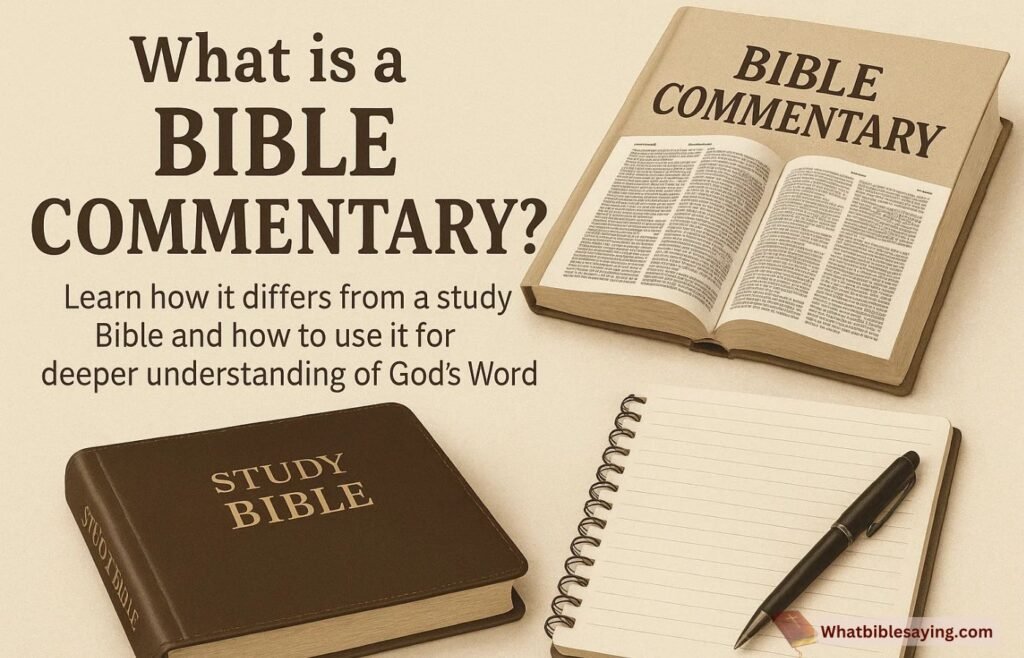What Is Bible Commentary? A Practical Guide for Everyday Faith
When I first began reading the Bible seriously, I remember feeling both amazed and a little overwhelmed. Some passages were crystal clear, while others felt like a puzzle. I often asked myself: What exactly does this mean? How do I apply this to my life?
That’s when I discovered something called a Bible commentary. It quickly became one of the most helpful companions on my faith journey, like having a wise pastor or teacher sitting beside me, gently explaining the background and meaning of God’s Word.
In this article, I want to walk with you through what a Bible commentary is, why it matters, how to use it wisely, and which ones might help you best. Whether you’re just starting your Bible study or have been reading Scripture for years, I believe you’ll find encouragement here.
What Is the Meaning of Bible Commentary?
At its core, a Bible commentary is a written explanation of Scripture. Think of it as a set of notes or reflections by someone who has studied the Bible deeply, its languages, history, culture, and theology.
Where the Bible gives us God’s inspired Word, the commentary tries to explain that Word in ways that make sense to us today. It doesn’t replace the Bible, it supports it.
The Bible itself: God’s living Word, perfect and inspired.
A commentary: Human effort to interpret, explain, and guide.
For example, if you’re reading the parable of the Good Samaritan in Luke 10, a commentary might explain the cultural tension between Jews and Samaritans at that time. Suddenly, the story feels even more powerful, because you understand just how radical Jesus’ teaching on love really was.
So when we ask, What is the meaning of Bible commentary?, it’s this: a tool to help us bridge the gap between the ancient world of Scripture and our modern lives.
What Is the Difference Between a Study Bible and a Bible Commentary?
This is a common question, and it’s a good one. Many people get confused because both study Bibles and commentaries include notes.
Study Bible
A Bible with brief notes at the bottom of each page. These notes give you quick insights but are usually short and general.Bible Commentary
A separate book (or set of books) that goes much deeper. Commentaries often explain each verse in detail, provide historical context, and even compare passages across the Bible.
Think of a study Bible as a pocket guide, while a commentary is like a full textbook. Both are useful, but in different ways. I often start with my study Bible when I’m reading devotionally, and if I want to dig deeper, I’ll turn to a commentary.
How Do You Use a Bible Commentary?
Now let’s get practical. Imagine you’re sitting at your kitchen table with a cup of coffee, Bible open to Romans 8. You’re reading Paul’s words about “life in the Spirit” and stumble on a phrase that feels a bit confusing.
Here’s how you could use a commentary:
Read the Scripture First
Always start with God’s Word itself. Let the passage speak to you before consulting other voices.Pray for Understanding
Ask the Holy Spirit to guide you. Remember, commentary is a human aid, but the Spirit is the true teacher.Consult the Commentary
Look up Romans 8 in your commentary. Read what the scholar or pastor says about the context, word meanings, and themes.Reflect and Apply
Ask yourself: How does this insight connect with my daily walk? How can I live out this truth today?
A commentary is not meant to replace your own Bible reading, it’s meant to enrich it. It’s like adding color and depth to a black-and-white sketch.
Are Bible Commentaries Good?
Some people worry that using commentaries might lead them to rely too much on human opinions instead of God’s Word. That’s a fair concern.
Here’s the truth: Bible commentaries are good when used wisely. They can illuminate passages you might otherwise miss, but they should never replace Scripture itself.
Think of it like cooking. The Bible is the meal, the nourishing food God provides. A commentary is like a seasoning or recipe guide. It makes the meal richer, but it’s not the food itself.
The key is balance. Use commentaries as companions, not as masters. Always weigh their insights against the whole counsel of Scripture.
Best Bible Commentary for Beginners
If you’re new to Bible study, the world of commentaries can feel overwhelming. There are one-volume commentaries, multi-volume sets, devotional commentaries, and scholarly ones. Which one is right for you?
Here are a few beginner-friendly recommendations:
The Bible Knowledge Commentary (by Dallas Seminary professors)
Clear, easy to follow, and covers the entire Bible.The Tony Evans Bible Commentary
Warm, pastoral, and practical, perfect if you like a devotional style.Matthew Henry’s Commentary (Concise Edition)
A classic, though older in style, it’s widely respected and available free online.NIV Application Commentary Series
Excellent at helping you apply Scripture to modern life.
My advice? Start with a one-volume commentary. It gives you a broad overview without overwhelming detail. As you grow, you can explore more specialized sets.
What Is a Bible Commentary Used For?
Commentaries serve different purposes depending on your needs. Here are a few ways you might use them:
Personal Devotions – For gaining deeper insights during your quiet time.
Sermon Preparation – Pastors often rely on them for historical and theological accuracy.
Group Bible Studies – To provide additional background for discussion.
Answering Questions – When a verse puzzles you, a commentary can provide clarity.
But beyond all these uses, the greatest purpose of commentary is to help you grow closer to Christ by understanding His Word more fully.
What Is the Best Bible Commentary?
This question is a little like asking, What’s the best meal? It depends on your taste, your needs, and where you are on your journey.
If you want depth: Word Biblical Commentary or NICOT/NICNT series.
If you want application: NIV Application Commentary.
If you want something pastoral: Tony Evans or Warren Wiersbe’s “Be” Series.
The best Bible commentary is the one that speaks to your heart, helps you grasp the meaning of Scripture, and inspires you to live it out.
What Is a Bible Concordance? (And How It Differs)
While we’re talking about Bible study tools, let’s clear up another common confusion: the difference between a commentary and a concordance.
Commentary: Explains the meaning of verses.
Concordance: Lists where words appear in the Bible.
For example, if you want to find every place the word “grace” appears, a concordance helps. If you want to understand what Paul means when he writes about grace, a commentary helps.
Together, they make a powerful team for study.
A Real-Life Example: Commentary in Action
Let me share a personal story. Years ago, I was reading Psalm 23. It’s a passage we all know, “The Lord is my Shepherd, I shall not want.”
But when I opened a commentary, I discovered that in ancient Israel, shepherds would often risk their lives to protect sheep from wild animals. Suddenly, the image of God as my Shepherd wasn’t just poetic, it was deeply protective, courageous, and loving.
That insight stayed with me during a season when I felt vulnerable. Every time I read Psalm 23 now, I don’t just see green pastures, I see a God who fights for me. That’s the gift a commentary can bring.
Common Misuses of Bible Commentaries
While commentaries are helpful, we must be careful not to misuse them. Here are a few pitfalls:
Overdependence – Relying on commentary more than the Bible itself.
Cherry-Picking – Only reading what supports your own opinions.
Ignoring the Spirit – Forgetting that true understanding comes from God, not just human wisdom.
A wise approach is to use multiple commentaries, compare their insights, and always keep Scripture central.
How to Choose a Commentary That Fits You
With so many options, how do you choose? Here are a few tips:
Consider Your Purpose – Devotional? Academic? Pastoral?
Look for Trusted Authors – Pastors, scholars, and teachers with good reputations.
Match Your Reading Level – Don’t start with something too technical.
Pray for Guidance – God cares about your study tools too.
Sometimes, you’ll find that a commentary you loved in one season no longer meets your needs in another, and that’s okay. Our tools grow with us.
Why Bible Commentary Still Matters Today
We live in an age of podcasts, videos, and instant access to information. So why bother with a commentary?
Because commentaries slow us down. They invite us to sit with the text, to listen more carefully, and to understand more deeply. They remind us that Scripture is not just a quick quote to post online, it’s a living Word that deserves reverence and attention.
In a world full of noise, Bible commentaries help us tune our ears back to God’s voice.
Bringing It All Together
So, what is Bible commentary?
It’s a tool for understanding Scripture.
It differs from a study Bible by going deeper.
It should be used prayerfully, with Scripture first.
It’s good, when balanced with the Spirit’s guidance.
There are wonderful options for beginners and beyond.
It pairs well with other tools like concordances.
Most importantly, Bible commentaries exist to draw us closer to God. They shine light on His Word, so we can walk more faithfully in His ways.
Final Encouragement
If you’ve never used a commentary before, don’t be intimidated. Start small. Let it sit beside your Bible, like a wise friend. Test what you read, hold it up to Scripture, and let the Holy Spirit confirm the truth.
The Bible will always be the foundation of your faith. A commentary simply helps you see the stones more clearly, the pathways more brightly, and the Shepherd’s voice more distinctly.
Remember: the goal is not just to understand the Bible better, it’s to know Jesus more deeply. And if a commentary helps you take one step closer to Him, then it’s worth every page.













